How to Become a Bounty Hunter in Utah: A Step-by-Step Guide
If you’re thinking about a career in Utah as a bounty hunter, you’re looking at a dynamic and interesting job that entails locating fugitives who have failed to post bail. The training, licensing, and legal requirements necessary to become a licensed bounty hunter—also referred to as a bail recovery agent—in Utah will all be covered in this tutorial.
Table of Contents
ToggleWhat is a Bounty Hunter in Utah?

Bail Recovery Agents are the official name for bounty hunters in Utah. These experts are in charge of tracking down and arresting those who were released on bond but have failed to appear in court. They make sure that defendants who do not show up for court are returned to custody by working closely with bail bond agencies.
Although bounty hunting in Utah can be lucrative, it is strictly regulated, and those who wish to engage in the activity must fulfill certain conditions.
The Different Roles in Utah’s Bounty Hunting Profession

- In Utah, bounty hunting has three main purposes:
- Bail Enforcement Agents
These are seasoned bounty hunters who have worked in law enforcement or bail enforcement for at least 2,000 hours. They have the authority to act autonomously and conduct fugitive recovery operations. - Bail Recovery Agents
These agents help fugitives be found and captured by bail enforcement authorities. A minimum of 1,000 hours of relevant experience is required. - Bail Recovery Apprentices
They work under the direction of more seasoned agents and are new to the field. Apprentices are not allowed to independently provide their skills to the general public.
Essential Requirements to Become a Bounty Hunter in Utah
In Utah, you have to meet certain conditions in order to lawfully work as a bounty hunter. These include fulfilling the requirements for citizenship and age, passing a background investigation, finishing the required coursework, and accumulating the appropriate amount of experience.
1. Age and Citizenship Criteria
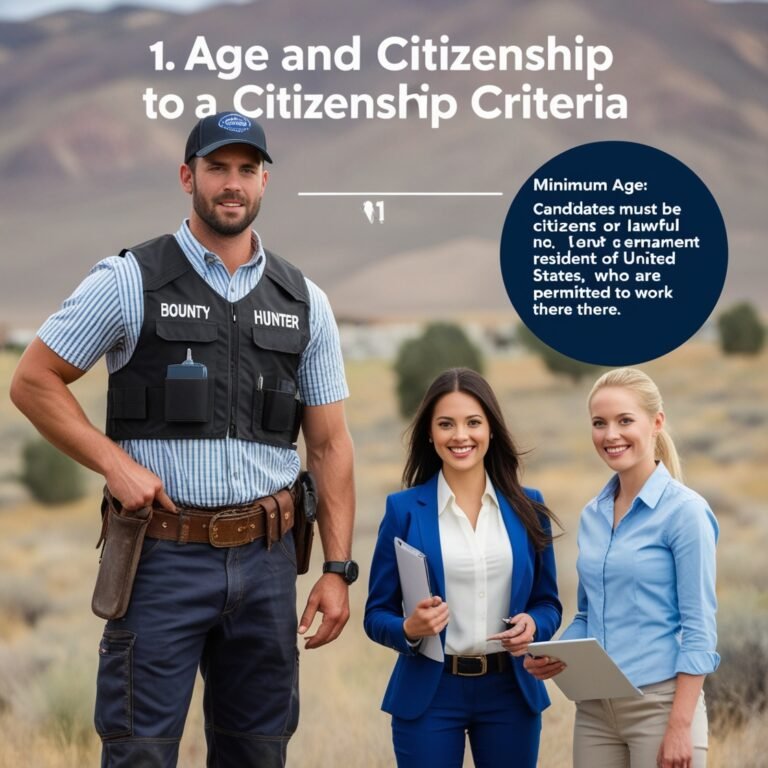
- Minimum Age: In Utah, you have to be at least 21 to work as a bounty hunter.
- Citizenship: Candidates must be citizens or lawful permanent residents of the United States who are permitted to work there.
2. Background Check
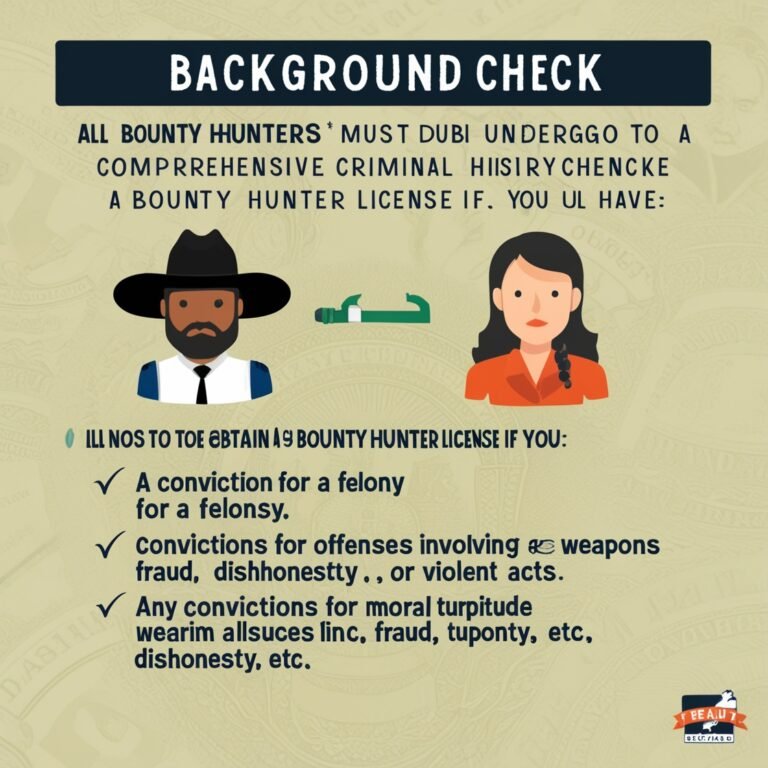
All bounty hunters must undergo a comprehensive criminal history check. You will not be allowed to obtain a bounty hunter license if you have:
- A conviction for a felony.
- convictions for offenses involving weapons, fraud, dishonesty, or violent acts.
- any conviction for moral turpitude, such as fraud, dishonesty, etc.
3. Required Training
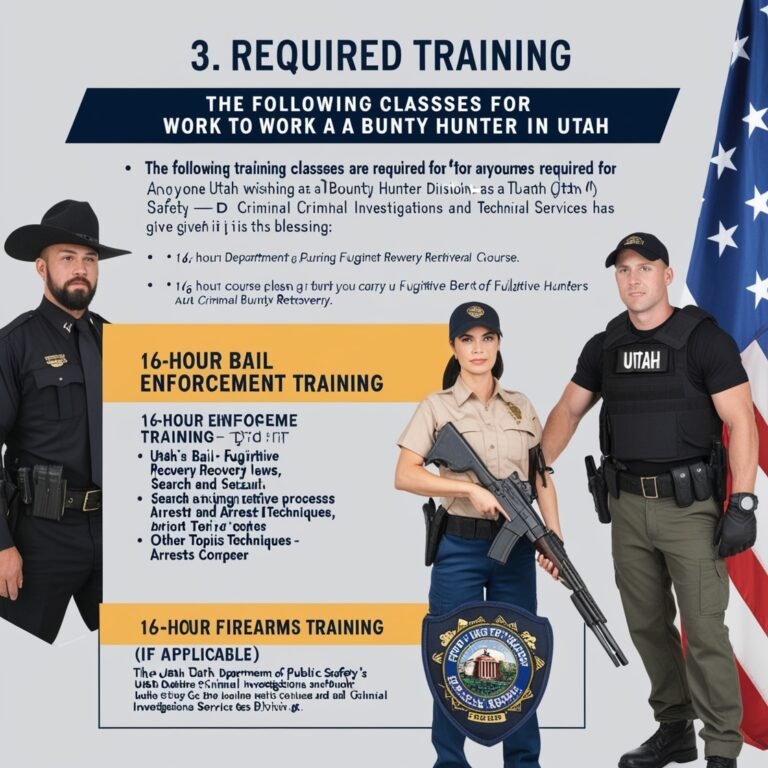
The following training classes are required for anyone wishing to work as a bounty hunter in Utah:
- 16-Hour Bail Enforcement Training
Utah’s fugitive recovery laws, search and seizure processes, arrest techniques, and other topics are covered in this course. - 16-Hour Firearms Training (If Applicable)
This course is required if you plan to carry a firearm during fugitive retrieval. The Utah Department of Public Safety’s Criminal Investigations and Technical Services Division has given it its blessing.
4. Experience Requirements
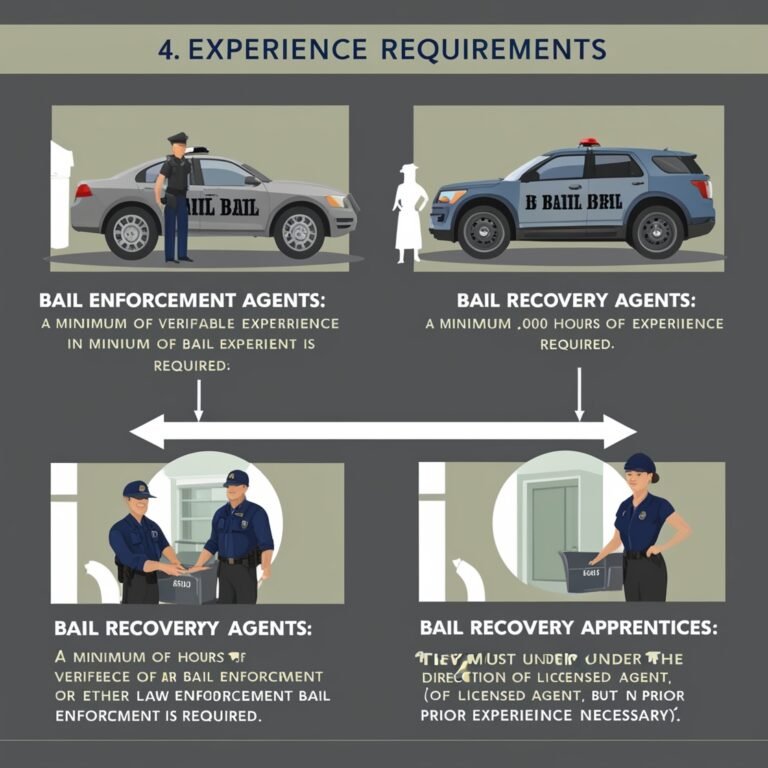
- Bail Enforcement Agents: A minimum of 2,000 hours of verifiable experience in either law enforcement or bail enforcement is required of bail enforcement agents.
- Bail Recovery Agents: A minimum of 1,000 hours of experience is required.
- Bail Recovery Apprentices: They must work under the direction of a licensed agent, but no prior experience is necessary.
The Licensing Process for Becoming a Bounty Hunter in Utah
There are several important processes involved in becoming a licensed bounty hunter in Utah. The procedure is broken down as follows:
Step 1: Complete Required Training

Prior to submitting an application for a bounty hunter license, you need to finish:
- 16-Hour Bail Enforcement Course
- 16-Hour Firearms Course (if applicable)
Step 2: Collect Necessary Documents
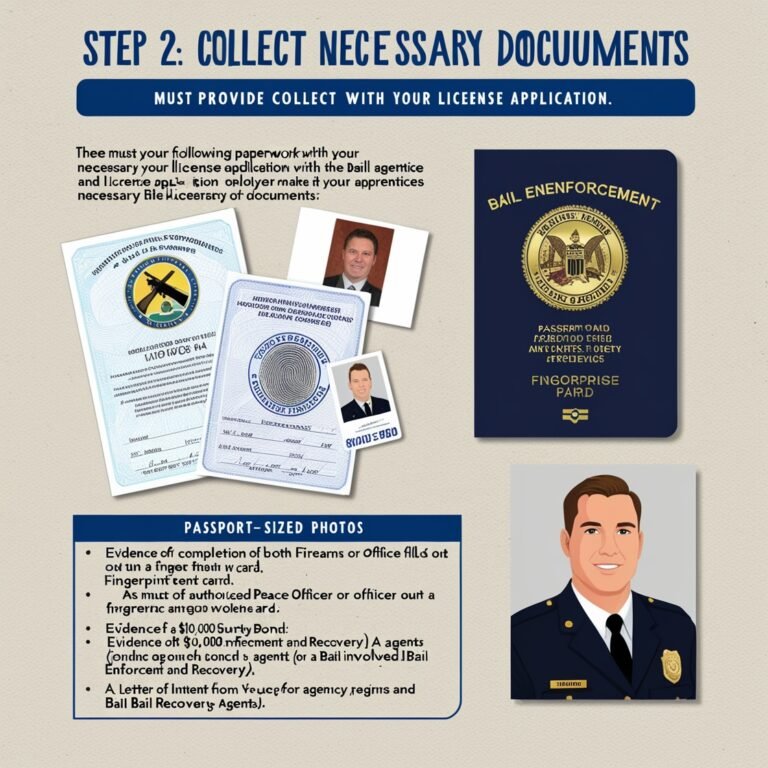
You must provide the following paperwork with your license application:
- Evidence of completion of both the firearms and bail enforcement courses.
- An authorized peace officer or office fills out a fingerprint card.
- passport-sized photos.
- Evidence of a $10,000 surety bond (for agents involved in bail enforcement and recovery).
- a letter of intent from your agency or employer (for apprentices and bail recovery agents).
Step 3: Submit Your Application

You can apply to the Bureau of Criminal Identification (BCI) of the Utah Department of Public Safety after obtaining the required paperwork. In Salt Lake City, the application must be turned in in person.
- Bail Enforcement Agents: $250 application fee
- Bail Recovery Agents: $150 application fee
- Bail Recovery Apprentices: $150 application fee
Step 4: Attend the Approval Meeting

You will be required to attend an approval meeting at the Bureau of Criminal Identification following the examination of your application. You’ll get your license if it’s accepted. However, only a licensed professional may supervise the work of Bail Recovery Apprentices and Bail Recovery Agents.
Job Prospects and Earnings for Bounty Hunters in Utah

Although precise compensation information for bounty hunters in Utah is not easily accessible, we can approximate prospective earnings by examining related occupations.
Career Opportunities:
Bail Bonding AgenciesIn Utah, there are 38 authorized bail bonding companies, and many of them use bounty hunters to find runaways.
Private InvestigatorsThe Bureau of Labor Statistics (BLS) reports that the median yearly compensation for private investigators in Utah is around $52,330. Bounty hunters probably demand similar salaries because they carry out similar tasks.
Security GuardsFor people who want to work in a security-related field, Utah has more than 5,600 security guards on staff.
Depending on their level of experience, the volume of cases they handle, and whether they work for a reputable bail bond company or on their own, bounty hunters in Utah may make a wide range of salaries.
The Rewards and Challenges of Bounty Hunting in Utah
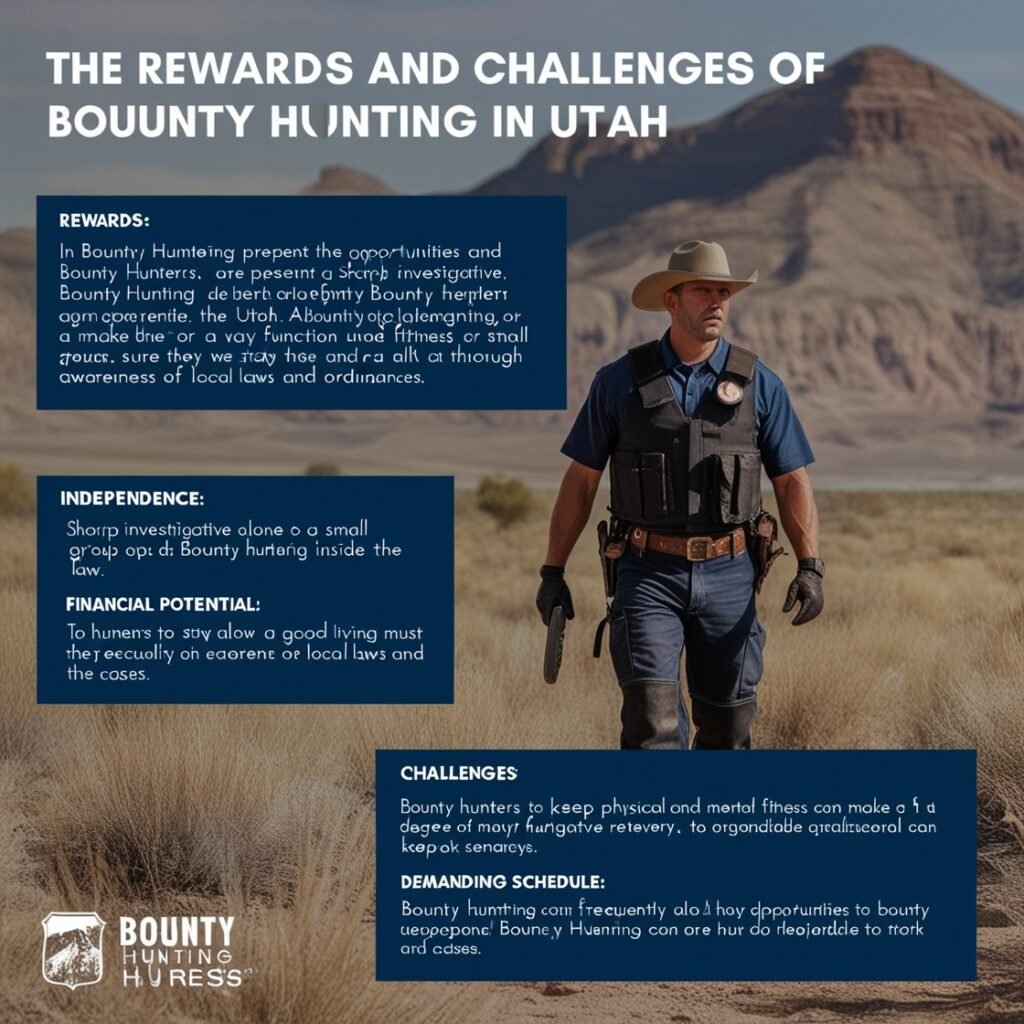
In Utah, bounty hunting presents both opportunities and difficulties. Sharp investigative abilities, physical fitness, and the capacity to function under duress are all necessary for the position. To make sure they stay inside the law, bounty hunters also need to have a thorough awareness of local laws and ordinances.
Rewards:
- Independence: The freedom to work alone or in a small group is appealing to many bounty hunters.
- Financial Potential: Proficient bounty hunters can make a good living, especially if they work for reputable organizations or take on a lot of cases.
Challenges:
- Dangerous Work: Hunters must keep a high degree of physical and mental fitness because fugitive retrieval can include dangerous scenarios.
- Demanding Schedule: Bounty hunting frequently calls for a lot of flexibility and long hours, and it can be unpredictable.
Conclusion
In Utah, becoming a bounty hunter needs a combination of education, work experience, and legal requirements. Meeting Utah’s stringent license standards is crucial whether you want to work as a bail enforcement agent, bail recovery agent, or bail recovery apprentice. With the correct training, this profession provides a rare, fulfilling chance to have a big influence on the legal system and have a lot of autonomy. if you need more information about hunting, so please check out our other guides article.

